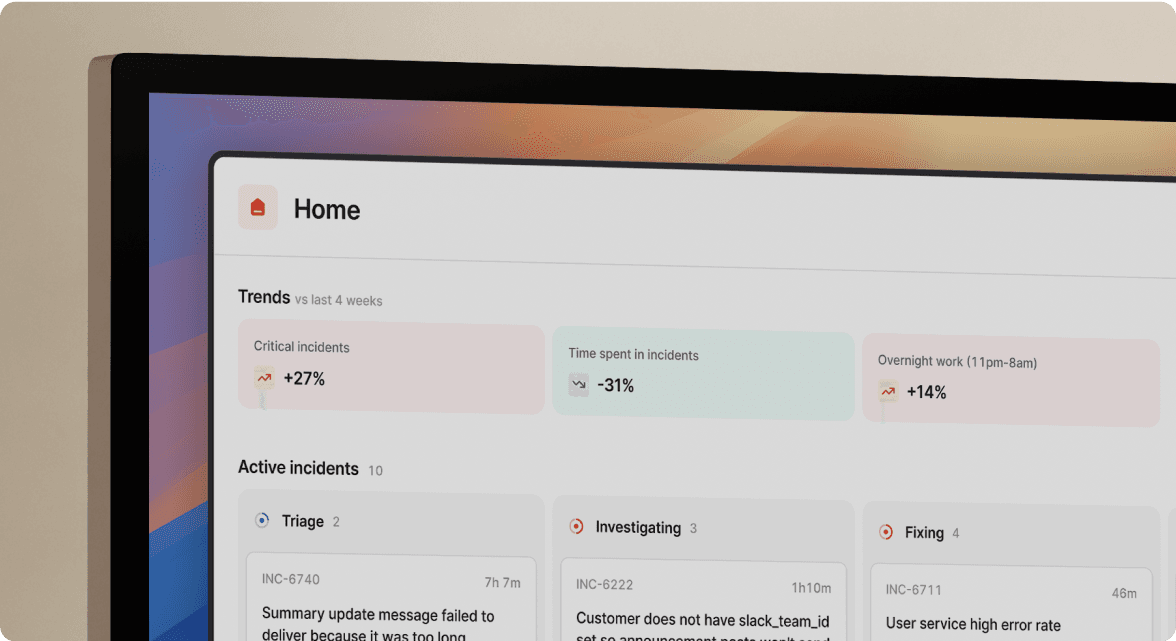Introducing incident.io MCP
August 27, 2025

We’ve just released the first version of incident.io’s MCP server. This means you can now talk to incident.io directly from AI assistants like Claude or Cursor, asking questions like:
- When did we last have an incident with Postgres?
- Can you create a new high severity incident called "Database performance degradation?"
- Can you summarize the incidents Chris dealt with this week and post them to the #handovers channel in Slack?
That last one is where it gets really interesting. Talking to incident.io through Claude is fun, but using it to connect systems and extend incident.io across your organization is where things get really interesting. In the context of incidents that might mean writing handover docs
With this first release, our MCP server exposes most of our API surface, so you can read and update incidents, manage your Catalog, trigger and attach alerts, and handle workflows and users without leaving your assistant.
Check it out and start playing around with the first release of our MCP server.
An exciting future for MCP
It’s no surprise we’re all in on AI at incident.io, and what we have here is really just the start. In terms of future additions, we see a bright future for MCP with additions like:
- Remote server support: This’ll allow you to connect MCP clients like Claude and Cursor directly to incident.io without running it locally, making setup and ongoing usage much simpler.
- Using MCP to extend AI SRE: Did we mention we’re building an AI SRE?! Whilst we’re currently building native integrations with tools like Grafana, Slack and GitHub, MCP will open the door for connecting other tools we don’t yet support straight into incident.io. Watch this space!
Build on incident.io
In case you missed it, we’re running Build on incident.io in the lead up to SEV0 2025. If you’d like to get cooking with Claude using our MCP server, API or other extension point, now’s the perfect time — with a brand new MacBook Pro up for grabs.
Disable fair scheduling

If you have a schedule with varied handover times, such as rotating one person for 2 days and another for 5 days, we use "fair scheduling" by default. This means we rotate users between the longer and shorter shifts. For example, with four people rotating between 2-day and 5-day shifts, we automatically ensure the same people aren't always assigned to shorter or longer shifts — keeping the workload balanced for everyone.
However, if you’d like a simpler rotation option where we just cycle through each user in sequence, you can now do so. For schedules with multiple varied handovers, you'll see an option next to the user list to switch between fair scheduling (the default) and round robin.
🚀 What else we’ve shipped
New
- We've published a new version of the Catalog importer which is more resilient to rate limits and also includes some minor updates to downstream dependencies
- You can now have expressions fall back to other expressions when setting an alert's priority
Improvements
- We’ve updated the Incidents tab to our newly refreshed tables to be more easily scanned
- We've separated out the iOS and Android documentation for bypassing do not disturb, so you don't need to scroll around as much to find what you're looking for when onboarding to the mobile app
- You can now filter alert insights by alert priority
- The 'team' filter in our mobile app is now available to all users, including those who aren't in a team
Bug fixes
- We've fixed an issue where Grafana and Alertmanager alerts were linking to the Grafana homepage rather than the specific alert that fired
- We've fixed an issue where the "Continue" and "Connect to incident" buttons were being clipped after you'd acknowledged an escalation in the mobile app
- We've fixed an issue where we weren't saving your input properly when trying to update a call route
- Make sure "use maximum severity from all attached alerts" option in alert routes always increases incident severity when a higher-severity alert is attached
- When using a daily rate for on-call pay configurations, we'll now correctly say daily instead of hourly
- Surface error message in Slack when a manual workflow can’t be triggered for an incident
- If you have multiple Jira instances connected to incident.io, our Jira alert source can now receive alerts from projects in all instances
- When publishing an on-call pay report, you'll no longer get incorrect 'unsaved changes' warnings!
So good, you’ll break things on purpose
Ready for modern incident management? Book a call with one of our experts today.

We’d love to talk to you about
- All-in-one incident management
- Our unmatched speed of deployment
- Why we’re loved by users and easily adopted
- How we work for the whole organization



